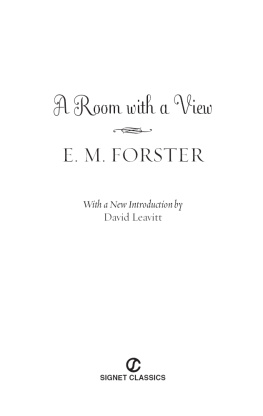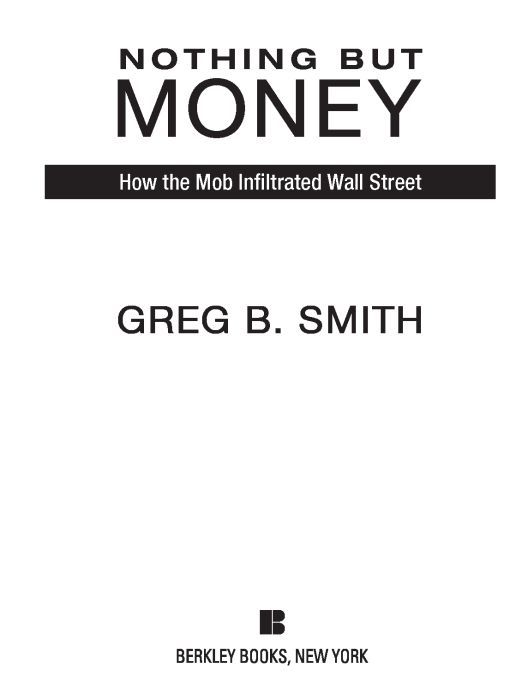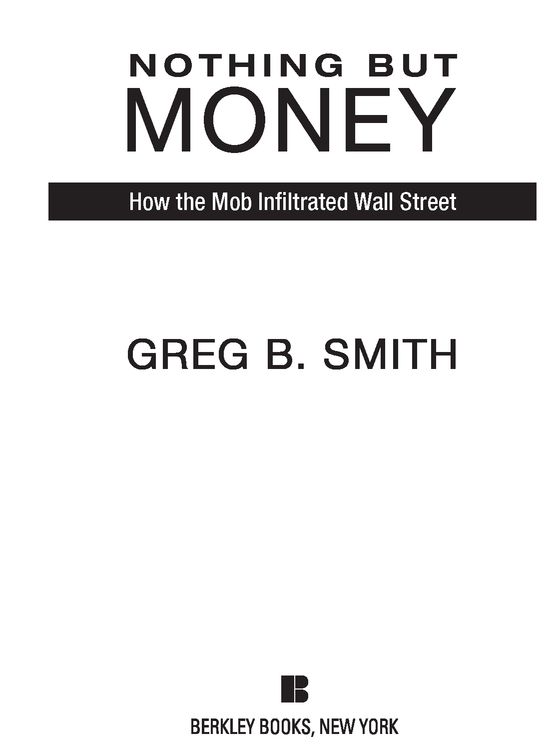Table of Contents
THE BRAINS...
Cary Cimino would supply the Wall Street experience;
Jeffrey Pokross, the brilliant plan.
THE BRAWN...
Robert Lino would offer the aid of organized crime.
The Mob would enforce.
THE BUSINESS...
The buyers on the stock market would never know
what hit them.
Berkley Titles by Greg B. Smith
NOTHING BUT MONEY
MOB COPS
MADE MEN
AUTHORS NOTE
Long before U.S. taxpayers began bailing out Wall Street with billions of their hard-earned dollars, there was the original Black Friday of 1869. It was spectacular and disastrous and caused millions in losses to investors from coast to coast, and it was mostly the work of one manJay Gould. When he died of tuberculosis at age fifty-six, one of his peers told reporters assembled on the doorstep of his Fifth Avenue mansion, Wall Street has never seen his equal and never will.
In 1869 Gould was one of the richest men in America, a man who controlled one out of every ten miles of railroad in the nation. Although he was truly a very wealthy man, wealth has a way of making its owners believe there is always a little more just down the road. The source of just a little more, Gould decided, was gold.
His scheme was simple but inspired. He would run up the price of gold, which would, in turn, pump up the price of wheat. Western wheat farmers would then sell their wheat as fast as they could, which would require wheat to be transported East over Goulds railroads. He was counting on fear and greed to line his pockets. It was a clever idea, and therefore, it turned into one of the worst financial disasters in Wall Street history.
Gould and his co-conspirators began buying up gold, inspiring others who saw his investment choices as a bellwether to jump in, too. The price of gold began to rise at an alarming pace, awakening the administration of Ulysses S. Grant from its slumber. President Grant then tried to put the brakes on the runaway train, ordering a major sell-off of government gold.
The sell-off had a different effect. That morning gold had reached a peak of $162. The White House sell message reached Wall Street at five minutes past noon that Friday, September 24, 1869, and within 15 minutes the price of gold had dropped to $133. In the words of the Brooklyn Eagle, Half of Wall Street was ruined.
In a system that relies on self-interest, these things are bound to happen. Gould had his reasons and explanations for his behavior, and he sought to make the case that he was just doing what capitalism demanded. Of course, this was not to be the final Black Friday or Unholy Thursday or Bloody Monday or whatever other modifier the press could dream up to illustrate the shock and horror of a sudden and allegedly unexpected crash. There would be many more, and although results of these market corrections were often differentsometimes the crash lasted awhile, sometimes there was a quick reboundthe underlying explanation often seemed quite similar. Everybody saw a run-up and wanted to get theirs before the money stopped flowing. Sometimes that involved cutting corners here and there. Sometimes that involved breaking laws. But the logic of Wall Street was consistentif everybody else is doing it, Id be a fool not to.
Such was the case during the dot-com craze of the late 1990s, a time of irrational exuberance that, looking back, now seems merely irrational. This was a time when small companies with absolutely no assets went public and money fell from the sky. This was the dawn of pump and dump, when the American Mafia decided it was time to take what they could out of Wall Street. It didnt last long. Just as Jay Goulds brilliant idea became Black Friday back in 1869, the party ended in a bad way. But if you were there when it all took off, for a while it seemed like there was nothing but money.
Greg B. Smith
March 9, 2009
CHAPTER ONE
December 17, 1987
Arthur Kill Road is the far end of nowhere in New York City. Running along the western edge of New Yorks smallest borough, Staten Island, it is not what youd call a tourist destination. The camera-wielding busloads that flood Manhattan religiously check out the Statue of Liberty, the Empire State Building, the Brooklyn Bridge. These are icons meant for collecting. Tourists might even hop the ferry to Staten Island, but thenimmediatelyreturn to Manhattan. If any out-of-towner found himself on the winding curves of Arthur Kill Road heading into the heart of Staten Island, the borough of landfills and subdivisions, he would only be there because he got lost. Very extremely lost. There is really no reason to go there if you are a tourist, or even a regular person. There are no pleasant sights to see. There are no hip restaurants, no cutting-edge galleries, no timeless museums. This is the working edge of New York. This is where people dump things.
In the frigid darkness of almost midnight, there were no cars of any typesave one. A lone driver made his way down the road, his headlights knifing into the December darkness. He couldnt see it, but out there, just a few yards away, dividing New York from New Jersey, was the Arthur Kill, a fetid river that had been polluted by the captains of industry since the nineteenth century. The fish were dead; birds avoided the place. The water was the color of black coffee, and on this night, its petroleum content kept it from freezing. The driver passed refineries with peppery smells and midnight fires. He passed a ship graveyard where the sad skeletons of freighters and tugboats named after somebodys mother or girlfriend were left to rot. Nobody else was in sight. He was happy the road was so lonely. He could see if he was being followed. He passed an auto graveyard, capturing it in his headlights, and then, finally, a lone signIsland Wholesale Fence. The driver, Robert Lino, dutiful son of a hopelessly corrupt father, had arrived.
Robert Lino was twenty-two years old, and he had barely finished the sixth grade. His writing was like that of a fourth grader. He had spent his entire life in the middle of Brooklyn, where he learned what he learned and never thought that there might be another way to live. While other kids from Brooklyn thought about basketball scholarships or nailing their Regents exams in high school to go on to a decent college and all the rest, Robert Lino acquired different expectations. Robert Lino was going to be part of the American Mafia. This was an almost unstoppable destination. He had grown up surrounded by it. His father was in the Mafia, his fathers brother, his fathers cousin. All were made members of organized crime, the way that some fathers were vice presidents of international banks or partners in law firms or professors of French literature.
Robert assumed his father was already at the spot on Arthur Kill Road where Robert had been told to show up. His father was Robert Lino Sr.Bobby Senior. He was a drug dealer. He dabbled in loan-sharking, collected protection payments, ran sports betting. He could also be called upon to shoot you in the head and roll you up in a rug. He had an official title in one of New Yorks five crime families, the Bonanno group. He was what they called a soldier, although the concept of rank and hierarchy was pretty flexible within the Bonanno group. Bobby Senior earned that title by being as devoted to a life of perfidy and deceit as a priest is to his order. Getting over was his religion. He loved the life, and he was hoping his son, Robert, would someday follow in his footsteps. That was why the father had phoned the son late on this December night and asked him to drive out to this desolate spot on the edge of the edge, on Arthur Kill Road in Staten Island.







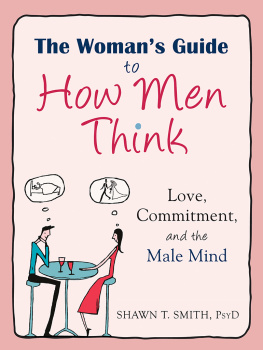

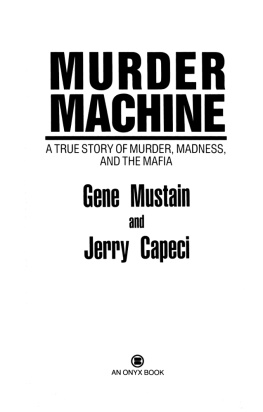
![Harry Turtledove - Worlds that werent : [novellas of alternate history]](/uploads/posts/book/79050/thumbs/harry-turtledove-worlds-that-weren-t-novellas.jpg)

